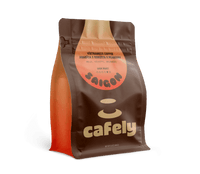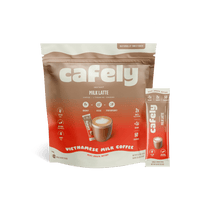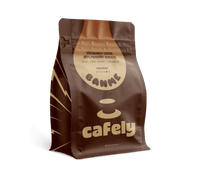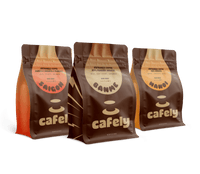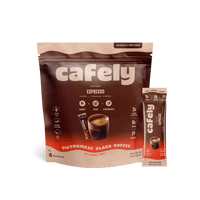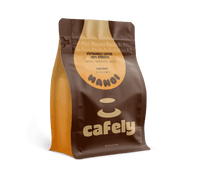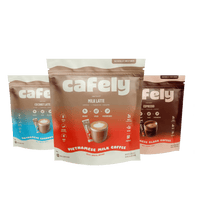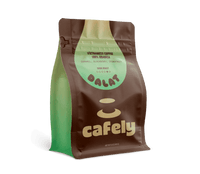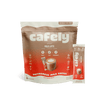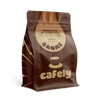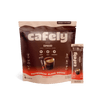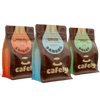Coffee begins to lose its flavor within two weeks of roasting — even in airtight containers — as aromatic oils evaporate. Freezing is a smart way to preserve freshness, locking in flavor and aroma for up to 6–12 months.
To do it right, store your beans in a completely airtight, opaque container or tightly sealed Ziploc bag. This prevents moisture, freezer burn, and light exposure. A vacuum sealer can help, but a tight seal is key. Done properly, freezing can keep your coffee tasting fresh for months.
How to Freeze Coffee Beans: Step-By-Step Guide

Freezing coffee beans is a fairly simple process, but you can get better results by remembering a few key tips along the way.
Follow this step-by-step guide to freezing your coffee beans to maximize flavor:
- Portion Smart — Freeze only what you'll use within 5–6 days after thawing since flavor fades faster once thawed. Calculate your daily use and divide accordingly.
- Use Airtight Bags — Grab airtight containers or Ziploc bags. You’ll likely need several bags based on your portion sizes.
- Seal Out Air — Press out as much air as possible before sealing. For a DIY vacuum seal, submerge the open bag carefully in water to push air out — avoid wetting the beans.
- Freeze Properly — Store sealed portions in the freezer for up to 1 year. Handle bags gently to avoid tears or unsealing.
- Thaw Correctly — Thaw frozen beans sealed at room temperature for 12–24 hours to prevent condensation and preserve flavor.
When Should You Freeze Coffee?
Freezing coffee correctly can be time-consuming. So, is it worth doing? Why not just leave the beans on the counter?
Most people freeze coffee beans because they have more than they can use within two weeks — the peak freshness window before beans start to stale. Freezing is a smart way to preserve flavor and avoid waste.
Another reason is to preserve premium or expensive beans. Freezing portions in airtight bags locks in their rich flavors, letting you savor them over time instead of rushing to finish them. We recommend doing this if you open a bag of Cafely coffee and don’t intend to use it within a week or two.
The Benefits of Freezing Coffee Beans
Freezing coffee offers more than just freshness.
Here’s why it’s a game-changer for long-term storage:
- Flavor Preservation — Freezing locks in the unique, delicate flavors of coffee for up to a year, keeping each cup vibrant and fresh.
- Build a Backup Supply — Saving a bit from every bag you buy means you’ll always have a reliable coffee stash when your favorite beans run out.
- Explore More Variety — Freeze different coffee types to create a diverse flavor “buffet.” Each trip to the freezer becomes a chance to try something new and exciting.
- Smoother Grinding — Frozen beans grind more evenly because they're brittle, improving extraction and taste. Just make sure to freeze individual portions — opening a large batch repeatedly invites moisture and dulls the flavor.
Common Mistakes When Freezing Coffee
For a long time, freezing coffee was not advised since it was thought to add excess moisture. Now, it’s considered normal among coffee enthusiasts looking to store artisan beans for long periods.
However, if you make these mistakes, you can completely ruin your coffee:
- Exposing Beans to Freezer Humidity — Freezers are cold but can still be humid. Moisture from the freezer can degrade flavor and aroma. Make sure to use airtight, moisture-proof containers or bags to create a protective barrier from humidity.
- Absorbing Freezer Odors — Although you may not smell it, freezers contain odor molecules from other foods. Coffee beans are highly porous and can absorb these smells. Store beans in tightly sealed, odor-resistant containers, and far away from frozen fish and other smelly foods.
- Opening the Container Too Soon — Opening a bag of cold coffee beans straight from the freezer causes condensation as warm air hits the cold surface. This leads to flavor loss. Let sealed portions thaw at room temperature (12–24 hours) before breaking the seal.
- Temperature Fluctuations — Areas near the freezer door are prone to small temperature shifts, causing beans to partially thaw and refreeze, which damages quality. Make sure to store your coffee beans deep in the freezer, where temperatures are most stable.
- Treating Thawed Beans Like Fresh — Thawed beans have a shorter shelf life (around 5–6 days) compared to the two weeks of freshly roasted beans. Freezing in small portions and using them within a few days ensures that each cup is as fresh as the last.
- Using Original Coffee Bags — Most retail coffee bags have a one-way valve, which prevents a truly airtight seal. This allows air and moisture in. Always repackage your coffee beans in fully airtight, valve-free containers or freezer bags before freezing.
Simple Tips to Freeze Coffee Well at Home

Frozen and thawed coffee can be just as delicious as fresh coffee, but only if you start with good beans and follow best storage practices.
Here are some tips that may help you freeze coffee better at home:
- Start with Fresh, High-Quality Beans — Freezing preserves what’s already there, so if the beans weren’t flavorful to begin with, freezing won’t improve them. The best results come from freezing fresh, premium beans at peak flavor.
- Always Label and Date — Avoid mystery bags in the freezer. Clearly label each container with the roast date and freeze date, so you can track freshness and use the beans that have been stored the longest first.
- Remember the 6-Day Rule — Thawed beans only stay fresh for 5–6 days. Make sure to freeze in small portions to avoid waste and enjoy full flavor in every brew.
- Invest in a Vacuum Sealer (Optional but Ideal) — While not essential, vacuum sealing significantly reduces oxidation and preserves flavor longer. Choose a model that fits your portion sizes — smaller units are more affordable and suit most home use.
FAQs: Can You Freeze Coffee Beans?
Want to learn more about storing coffee?
Check out the answers to the FAQs below:
1. Can Coffee Beans Get Freezer Burn?
Yes, coffee beans can get freezer burn. If they're improperly stored, moisture can get into them and ruin their aromas and flavors.
2. Can You Freeze Ground Coffee?
Storing ground coffee is essentially the same as storing coffee beans — an opaque, airtight container is the best way to maintain its flavor. When freezing, the method is also the same as with beans — place the grounds into an airtight container and store them deep in the fridge. To thaw, remove them from the freezer and allow them to come to room temperature overnight, then use within six days.
3. How Do You Thaw Frozen Coffee Beans?
Thawing frozen coffee beans is simple. Remove the coffee beans from the freezer. Then, place the bag or container on the countertop and allow the beans to thaw overnight. Once thawed, use the beans within three to six days.
4. When Should You Freeze Coffee Beans vs Storing Them as Normal?
Freshly roasted beans have a shelf life of around two weeks before they go stale. Therefore, if you’ve got more beans than you can use in two weeks, it’s wise to freeze the remainder. People also freeze coffee beans when they’ve got an expensive bag and want to store them in portions for later use.
5. Does Freezing Coffee Beans Cause Condensation?

Freezing doesn’t innately cause condensation, but when the coffee beans are removed from the freezer and opened while still cold, condensation will form. This moisture can lead to flavor degradation, so avoid opening the container until the beans have thawed to room temperature overnight. Also, avoid thawing and refreezing.
6. Can You Freeze Coffee Beans in the Original Packaging?
No. Most quality coffee is sold in vacuum-sealed packaging or bags with a one-way valve. You must store coffee in an airtight container or bag.
7. Should You Put Coffee Beans in the Fridge?
Putting coffee beans in the fridge isn’t a good idea. The humidity in your fridge will cause the beans to degrade faster. Even if the beans were stored in an airtight container, the coolness of the fridge can cause condensation to form.
8. Does Freezing Coffee Beans Change Their Flavor?
No, freezing coffee beans doesn't change the flavor of the beans in any meaningful way. The combination of low temperature and lack of airflow preserves flavors within the beans very well.
9. Are 4-Year-Old Coffee Beans Still Good?
No. Coffee beans stored at room temperature are good for two to four weeks. Frozen coffee beans are good for up to one year.
10. Can You Use Coffee Beans From Frozen?
Yes, you can use frozen coffee beans, and some professionals recommend it. When frozen, the beans become more brittle, meaning that when ground, a uniform consistency is created, leading to more even extraction.
